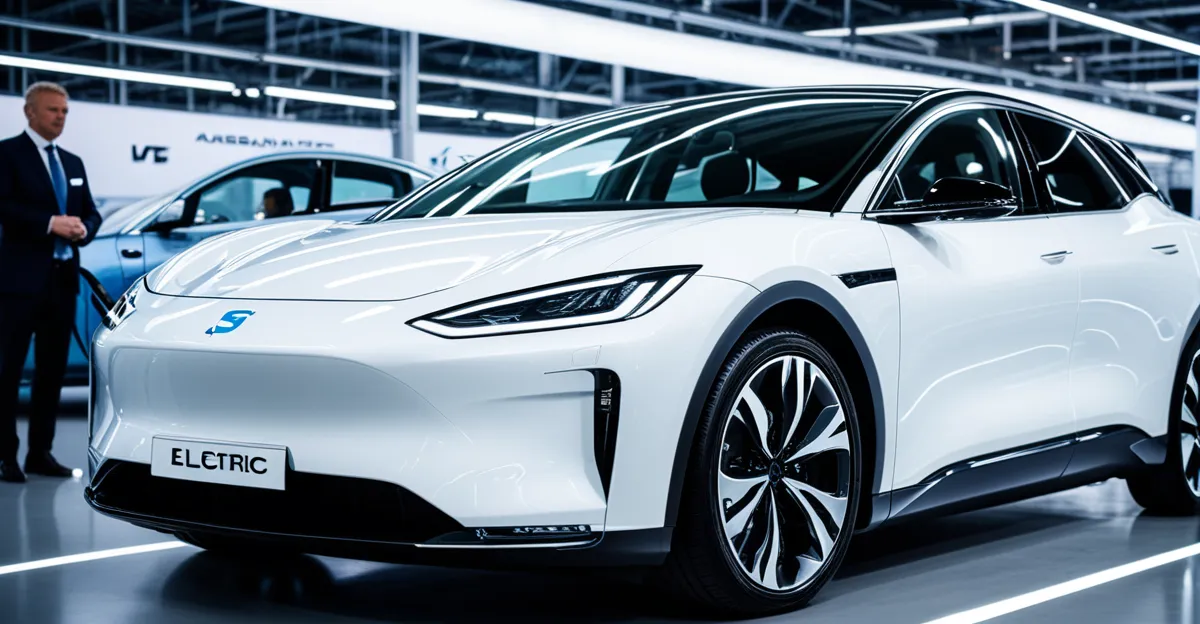Current Trends in the UK Automotive Industry
The UK automotive industry trends increasingly highlight a robust shift towards electric cars UK. Recent market data shows that the adoption rate for EVs has grown considerably, driven by heightened consumer interest and government incentives. This rise in electric cars UK is reshaping the overall automotive landscape, influencing manufacturing, sales, and supply chain priorities.
Analyzing the automotive market analysis reveals that while total vehicle sales face fluctuations due to economic factors, the share of electric vehicles continues to expand steadily. This pivot is also affected by global market dynamics, where innovations and environmental commitments outside the UK pressure domestic automakers to adapt rapidly.
In parallel : How Can Emerging Technologies Revolutionize Passenger Experience in the UK Automotive Sector?
In addition to demand-side growth, production adjustments align with technological advances and regulatory pressures. The trend is evident in the UK automotive industry trends, where electrification leads strategies and innovation. Companies investing heavily in EV technology are positioning themselves to capitalize on upcoming market demands, making this a defining period for the sector. This transformation underscores the critical nature of continuous automotive market analysis for stakeholders seeking to understand and navigate evolving UK automotive industry trends.
Impact of Government Policies and Regulations
Government action is a powerful driver of the UK automotive industry trends, especially in promoting electric cars UK. The UK government EV policy centers on ambitious zero-emission targets, including plans to end sales of new petrol and diesel cars by 2030. This regulatory framework compels automakers to recalibrate their strategies, accelerating investment in EV production.
Topic to read : How Can the UK Automotive Industry Lead a Sustainable Future?
Key automotive regulations focus on emissions standards and incentives for adopting zero-emission vehicles. For example, grants and tax reductions aim to lower consumer costs and stimulate demand for electric cars UK. These policies not only encourage manufacturers to increase EV offerings but also foster infrastructure development, such as expanding charging networks.
Addressing the why, the government’s approach aligns economic goals—like supporting automotive jobs—with environmental objectives to reduce urban pollution and carbon emissions. This dual focus ensures the UK automotive industry trends remain responsive to both market needs and climate commitments.
By continually refining regulations, the UK government creates a predictable environment that helps industry players plan long-term. These policies form the backbone for the ongoing transition towards a cleaner, more sustainable automotive sector.
Technological Developments in Electric Vehicles
Innovation in EV technology UK is pivotal to advancing the UK’s electric cars UK market. Battery innovation leads this progress by enhancing energy density, reducing charging times, and increasing lifespan. These improvements directly impact EV range and reliability, making electric cars UK more practical and appealing to consumers. For example, solid-state batteries are emerging as a game-changer, offering safer and more efficient energy storage.
Automotive R&D efforts are focused on integrating these battery advancements with smart technologies. UK automakers are investing heavily in connected car systems that enable real-time diagnostics, over-the-air updates, and improved driving assistance. This digital integration boosts overall EV performance and user experience, crucial for encouraging wider adoption.
Moreover, research is exploring lightweight materials to improve efficiency and reduce production costs. UK automotive industry trends reflect a strong commitment to innovation, as companies collaborate with universities and tech firms to accelerate EV technology UK development. This evolving landscape ensures that electric cars UK remain at the forefront of sustainability and performance in a competitive market.
Strategic Responses of Major Automakers
Major automakers in the UK are intensifying their focus on automaker strategies UK to lead the transition towards electric vehicles. They are committing to increased EV manufacturing by expanding production facilities dedicated to electric cars UK and upgrading supply chains to support new technologies. This shift is driven by both market demand and regulatory pressures, making electrification a core business priority.
In addition to scaling production, automaker strategies UK emphasize incorporating cutting-edge technology into future automotive models. This includes investments in battery technology, software integration, and vehicle design tailored for enhanced electric mobility. Companies are launching new electric car variants to capture different market segments, from affordable city cars to premium SUVs.
These strategic moves also reflect changes in supply chain management, addressing challenges such as sourcing critical materials sustainably and ensuring resilience amid global disruptions. Automakers are working closely with suppliers to secure batteries and electronic components vital for EV manufacturing.
Ultimately, UK automaker strategies demonstrate a commitment to long-term innovation and sustainability, preparing the industry for rapid growth in electric cars UK while maintaining competitiveness in a transforming global automotive landscape.
Infrastructure, Supply Chain, and Adoption Barriers
The EV infrastructure UK is rapidly expanding but remains a critical factor influencing electric cars UK adoption rates. While public and private sectors invest heavily in increasing the charging network, coverage still varies significantly across urban and rural areas. Fast-charging stations are prioritized to reduce range anxiety, a notable barrier for many potential EV buyers.
Regarding the automotive supply chain challenges, sourcing key materials like lithium and cobalt for batteries has become more complex due to geopolitical and environmental constraints. These challenges affect production timelines and costs, necessitating strategic supplier partnerships and investment in sustainable sourcing. UK manufacturers are exploring recycling initiatives to reduce dependence on virgin materials, aligning with broader industry sustainability goals.
Consumer adoption barriers also include perceived high upfront costs and concerns over battery longevity. However, ongoing advances in battery technology and increasing government incentives are gradually addressing these issues. By improving EV infrastructure UK and overcoming supply chain hurdles, the industry aims to stimulate broader market growth and support the electric cars UK transition effectively and sustainably.
Comparison with Alternative Automotive Technologies
While electric cars UK dominate current discussions, hydrogen cars UK and hybrid vehicles remain relevant in the broader landscape of sustainable transport technologies. Hydrogen cars UK use fuel cells to convert hydrogen into electricity, emitting only water vapor, offering quick refueling times and long ranges—advantages over some electric vehicles. However, they face significant challenges, such as limited refueling infrastructure and high production costs, which currently restrict widespread adoption.
Hybrid vehicles provide a transitional technology by combining internal combustion engines with electric motors. This blend offers improved fuel efficiency and lower emissions than conventional vehicles but does not achieve the zero-emission targets targeted by the UK automotive industry trends. Hybrids are often considered a practical step for consumers hesitant to switch fully to electric cars UK.
Investment trends show that automakers and governments are focusing more heavily on electric cars UK, but alternative technologies like hydrogen and hybrids still receive funding for research and niche applications. These options complement the electric vehicle market and may serve specific segments or future needs within the UK’s evolving automotive ecosystem.
Economic and Environmental Impacts
The transition to electric cars UK significantly influences the economic impact EVs have across the UK economy. Studies show that increased EV production supports the creation of skilled jobs in manufacturing, battery technology, and software development, boosting the UK automotive jobs sector. As automakers ramp up EV manufacturing, supply chains diversify to include new suppliers specializing in critical materials and components, fostering broader industrial growth.
Environmentally, the shift delivers clear environmental benefits automotive by reducing greenhouse gas emissions and lowering urban air pollution. Electric cars UK produce zero tailpipe emissions, directly contributing to national climate goals. However, environmental gains depend on the sustainability of electricity sources powering these vehicles and responsible battery lifecycle management.
Economic advantages also stem from reduced fuel costs and less dependence on imported oil, enhancing energy security. Nonetheless, challenges remain in balancing the initial investment costs for consumers and infrastructure development to sustain long-term adoption.
Overall, ongoing automotive market analysis underscores that sustained coordination between industry and policy-makers is critical. Aligning economic incentives with environmental priorities ensures the UK automotive industry trends toward a competitive and sustainable future.




